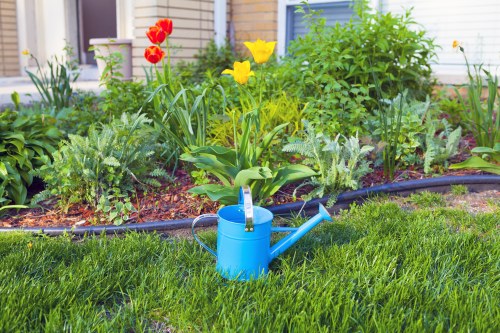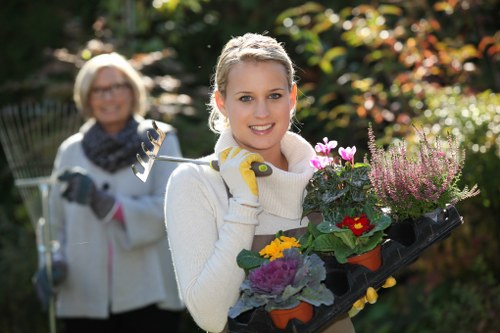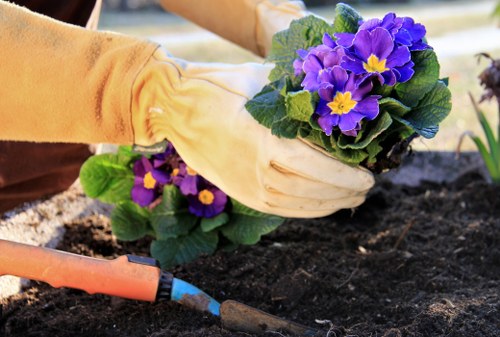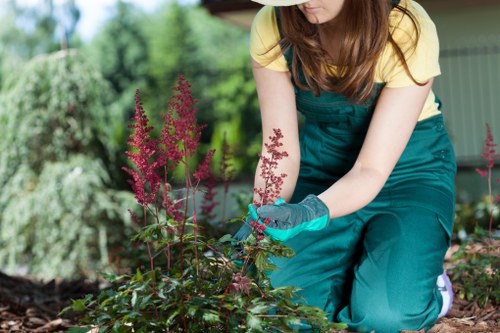Transform Your Outdoor Space: Landscape Gardening in Ruislip

Introduction to Landscape Gardening
Landscape gardening in Ruislip offers homeowners and garden enthusiasts the opportunity to create stunning outdoor spaces that blend beauty with functionality. Whether you have a sprawling garden or a compact backyard, landscape gardening can enhance the aesthetic appeal and value of your property.
In Ruislip, where the climate is conducive to a variety of plants, gardening enthusiasts can experiment with different styles and plant selections to create a personalized oasis. From traditional English gardens to modern minimalist designs, the possibilities are endless.
Understanding the fundamentals of landscape gardening is essential for achieving a harmonious and thriving garden. This includes soil preparation, plant selection, and proper maintenance practices.

Planning Your Landscape Garden
Assessing Your Space
Before diving into landscape gardening, it's crucial to assess the available space in your Ruislip garden. Consider factors such as sunlight exposure, soil quality, and existing structures. Measuring the area and sketching a layout can help visualize the end result.
Take note of any challenges your garden may present, such as slopes, drainage issues, or shaded areas. Addressing these factors early on will ensure that your garden design is both practical and aesthetically pleasing.
Additionally, think about how you intend to use your garden. Do you want a space for entertaining, a peaceful retreat, or a play area for children? Defining the purpose of your garden will guide your design decisions.
- Measure your garden space carefully.
- Identify sunlight and shade areas.
- Note any existing features or obstacles.
- Determine the primary use of your garden.

Choosing the Right Plants
Climate Considerations
Ruislip's temperate climate allows for a diverse range of plants to thrive. When selecting plants for your landscape garden, consider the local climate conditions, including temperature ranges, rainfall, and seasonal changes.
Opt for native plants when possible, as they are well-adapted to the local environment and require less maintenance. Additionally, native plants support local wildlife, enhancing biodiversity in your garden.
Incorporating a mix of perennials, annuals, shrubs, and trees can create a layered and dynamic garden. Each plant type offers unique textures, colors, and heights, contributing to the overall aesthetic.
- Choose native species for better adaptability.
- Mix different plant types for diversity.
- Consider seasonal blooms to maintain year-round interest.
- Select plants based on sun and shade requirements.

Design Elements in Landscape Gardening
Hardscaping Features
Incorporating hardscaping elements such as paths, patios, and garden walls can add structure and functionality to your landscape garden. These features not only enhance the visual appeal but also provide practical benefits like defined walkways and seating areas.
Choosing materials that complement your garden's style is essential. For a traditional look, consider using natural stone or brick, while modern designs may benefit from sleek concrete or metal finishes.
Properly placed hardscaping elements can create focal points and guide visitors through your garden. They also offer opportunities for creative expression through design and material selection.
- Paths and walkways for easy navigation.
- Patios for outdoor seating and entertainment.
- Walls and fences for privacy and definition.
- Water features like fountains or ponds for a serene ambiance.

Plant Care and Maintenance
Soil Preparation
Healthy soil is the foundation of a thriving landscape garden. In Ruislip, preparing your soil involves testing its pH levels, nutrient content, and drainage capabilities. Amend the soil as needed with compost, fertilizers, or other organic matter to create an optimal environment for plant growth.
Mulching is another crucial aspect of soil maintenance. It helps retain moisture, suppress weeds, and regulate soil temperature, contributing to healthier plants.
Regularly inspecting your soil and making necessary adjustments ensures that your plants receive the nutrients they need to flourish throughout the growing season.
Watering Practices
Proper watering is essential for maintaining a healthy landscape garden. In Ruislip’s climate, it’s important to establish a consistent watering schedule that considers rainfall patterns and the specific needs of your plants.
Using drip irrigation systems or soaker hoses can provide efficient and targeted watering, reducing water waste and ensuring that plants receive adequate moisture.
Avoid overwatering, which can lead to root rot and other issues. Instead, monitor soil moisture levels and adjust your watering routine accordingly.
- Test soil pH and nutrient levels.
- Amend soil with compost and organic matter.
- Use mulch to conserve moisture.
- Implement efficient watering systems.
Seasonal Considerations
Spring Planting
Spring is the ideal time for planting new flowers, shrubs, and trees in your Ruislip garden. With increasing daylight and warmer temperatures, plants are primed for growth. Prepare your garden beds by clearing debris and enriching the soil before introducing new plants.
Consider planting annuals that bloom throughout the summer to provide vibrant color and attract pollinators.
Summer Maintenance
In the summer months, focus on maintaining your garden by watering regularly, pruning overgrown plants, and managing pests. Mulching can help retain soil moisture, while shading more delicate plants can protect them from intense heat.
Autumn Preparation
Autumn is a time for preparing your garden for the winter months. Remove dead or diseased plants, and mulch heavily to protect roots from freezing temperatures. This season is also perfect for planting bulbs that will bloom in the spring.
Winter Care
During winter, focus on protecting your garden from frost and harsh weather. Use frost covers or cold frames to shield sensitive plants and ensure that structures like trellises and pergolas are secure.
Sustainable Gardening Practices
Water Conservation
Implementing water conservation techniques is vital for sustainable landscape gardening in Ruislip. Collecting rainwater through rain barrels and using it for irrigation reduces reliance on municipal water sources.
Planting drought-resistant species and utilizing mulch can significantly decrease water usage, promoting a more eco-friendly garden.
Organic Gardening
Opting for organic gardening methods enhances soil health and reduces the need for chemical fertilizers and pesticides. Composting kitchen scraps and garden waste recycles nutrients back into the soil, fostering a natural and balanced ecosystem.
Wildlife-Friendly Gardens
Creating a habitat that supports local wildlife contributes to a thriving garden ecosystem. Incorporate native plants that provide food and shelter for birds, bees, and other beneficial insects.
- Install rainwater harvesting systems.
- Use organic fertilizers and pest control methods.
- Create habitats with native plants.
- Reduce chemical usage to protect pollinators.
Enhancing Your Garden with Features
Edible Landscaping
Integrating edible plants into your landscape garden combines beauty with functionality. Herbs, vegetables, and fruit-bearing trees not only add diversity to your garden but also provide fresh produce for your kitchen.
Raised beds and container gardening are excellent options for maximizing space and ensuring optimal growth conditions for edible plants.
Water Features
Water features like ponds, fountains, and waterfalls introduce a calming element to your garden. The sound of flowing water can create a serene atmosphere and attract wildlife such as birds and frogs.
Lighting
Strategic garden lighting enhances the beauty of your landscape after dark and improves safety. Use a combination of pathway lights, spotlights, and ambient lighting to highlight key features and create a welcoming nighttime environment.
- Incorporate plants that produce fruits and herbs.
- Create raised beds for better plant management.
- Add ponds or fountains for visual appeal.
- Use solar-powered lights for eco-friendly illumination.
Hiring Professional Landscape Gardeners
Benefits of Professional Services
While DIY landscape gardening can be rewarding, hiring professional landscape gardeners in Ruislip brings expertise and efficiency to your project. Professionals can offer tailored designs that suit your specific needs and preferences.
They have the knowledge of local plant species and the skills to tackle complex landscaping challenges, ensuring a beautiful and sustainable garden.
Choosing the Right Service
When selecting a landscape gardening service in Ruislip, consider their experience, portfolio, and client reviews. Ensure they understand your vision and can provide solutions that align with your budget and timeline.
- Assess the experience and expertise of the gardener.
- Review past projects and client testimonials.
- Discuss your vision and requirements clearly.
- Compare quotes to find a service that fits your budget.
Maintenance Services
Professional maintenance services ensure that your garden remains pristine and healthy throughout the year. Regular maintenance includes pruning, weeding, fertilizing, and pest control, allowing you to enjoy your garden without the hassle of upkeep.
Many landscape gardening companies offer customized maintenance packages to meet the unique needs of your garden.
Incorporating Sustainable Elements
Rain Gardens
Rain gardens are a sustainable feature that manages stormwater runoff and enhances the beauty of your landscape. By planting water-tolerant vegetation in designated areas, rain gardens absorb excess rainwater, reducing the risk of flooding and erosion.
Green Roofs
For homes with flat roofs, green roofs provide an innovative way to incorporate greenery into your landscape. Covered with soil and plants, green roofs improve insulation, reduce energy costs, and support biodiversity.
- Create rain gardens to manage stormwater.
- Install green roofs for additional plant space.
- Use permeable materials in hardscaping to allow water infiltration.
- Implement composting systems to enrich the soil naturally.
Trends in Landscape Gardening
Minimalist Designs
Minimalist landscape gardening emphasizes simplicity and clean lines. By reducing clutter and focusing on essential elements, minimalist gardens create a tranquil and orderly space.
Climate-Responsive Gardens
With an increasing focus on sustainability, climate-responsive gardens adapt to changing weather patterns. This includes selecting drought-resistant plants and implementing energy-efficient irrigation systems.
Technology Integration
Modern landscape gardens incorporate technology such as smart irrigation systems and automated lighting. These advancements enhance convenience and contribute to efficient garden management.
- Embrace simplicity with clean, uncluttered designs.
- Choose plants and features that respond to climate needs.
- Utilize smart technology for irrigation and lighting.
- Incorporate sustainable materials and practices.
Conclusion
Landscape gardening in Ruislip is a rewarding endeavor that transforms outdoor spaces into beautiful, functional, and sustainable environments. By carefully planning, selecting the right plants, and incorporating design elements, you can create a garden that reflects your personal style and meets your practical needs.
Whether you choose to embark on the journey yourself or enlist the help of professional landscape gardeners, the key to a successful garden lies in ongoing care and maintenance. Embrace the process, and enjoy the myriad benefits that a well-designed landscape garden brings to your home and lifestyle.
Ready to transform your outdoor space? Contact us today to start your landscape gardening project in Ruislip!